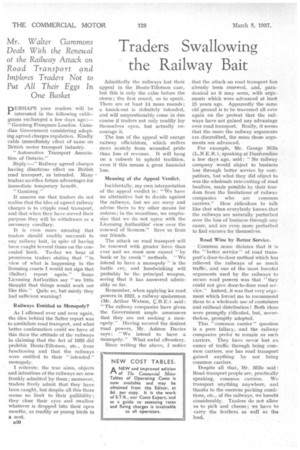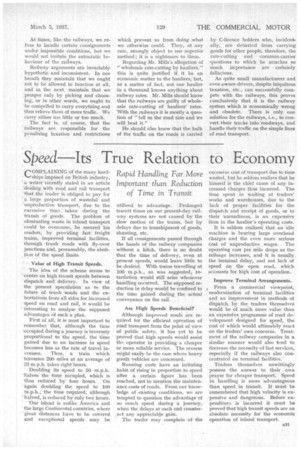Traders Swallowing the Railway Bait
Page 48

Page 49

If you've noticed an error in this article please click here to report it so we can fix it.
Admittedly the railways lost their appeal in the Bouts-Tillotson case, but this is only the calm before the storm ; the first round, so to speak. There are at least 14 more rounds ; a knock-out is definitely intended, and will unquestionably come in due course if traders not only readily lay themselves open, but actually encourage it.
The loss of the appeal will enrage railway officialdom, which suffers more acutely from wounded pride than loss of revenue. It will hang on a cobweb to uphold tradition, even if this means a great financial loss.
Meaning of the Appeal Verdict.
Incidentally, my own interpretation of the appeal verdict is "We have no alternative but to decide against the railways, but we are sorry and advise them to try other means for redress ; in the meantime, we emphasize that we do not agree with the Licensing Authorities' view over the renewal of licences." Save us from our friends.
The attack on road transport will be renewed with greater force than ever and we must now expect "by hook or by crook" methods. "We intend to have a monopoly • ' is the battle cry, and hoodwinking will probably be the principal weapon, seeing that it has answered admirably so far.
Remember, when applying .;,-)r road powers in 1922, a railway spokesman (Mr. Arthur Watson, C.B.E.) said : "The railway companies have given the Government ample assurances that they are not seeking a monopoly." Having secured the desired road powers, Mr. Ashton Davies says : "We intend to have a monopoly." What awful effrontery.
Since writing the above, I notice
that the attack on road transport has already been renewed, and, paradoxical as it may seem, with arguments which were advanced at least 15 years ago. Apparently the same old ground is to be traversed all over again on the pretext that the railways have not gained any advantage over road transport. Really, it seems that the more the railway arguments are discredited, the more those arguments are advanced.
For example, Mr. George Mills (L.N.E.R.), speaking at Dunfermline a few days ago, said : "No railway company would object to business lost through better service by competitors, but what they did object to was the wholesale rate-cutting of road hauliers, made possible by their frees clom from the limitations of railway companies who are common carriers." How ridiculous to talk like that when everybody knows that the railways are naturally perturbed over the loss of business through any cause, and are even more perturbed to find excuses for themselves.
Road Wins by Better Service.
Common sense dictates that it is the "better service" of road transport's door-to-door method which has relieved the railways of so much traffic, and one of the most forceful arguments used by the railways to secure road powers was that "thy could not give door-to-door road service." Indeed, it was that very argument which forced me to recommend them to a wholesale use of containers and railhead distribution Both ideas were promptly ridiculed, but, nevertheless, promptly adopted.
This "common carrier" question is a pure fallacy, and the railway companies prefer to remain as such carriers. They have never lost an ounce of traffic through being common carriers, nor has road transport gained anything by not being common carriers.
Despite all that,. Mr. Milts said : Road transport people are, practically speaking, common carriers. We transport anything anywhere, and thanks to the onerous packing conditions, etc., of the railways, we benefit considerably. Traders do not allow us to pick and choose ; we have to carry the feathers as well as the lead. At times, like the railways, we refuse to handle certain consignments under impossible conditions, but we would not imitate the autocratic behaviour of the railways.
Railway arguments are invariably hypothetic and inconsistent. In one breath they maintain that we ought not to be allowed to function at all, and in the next_ maintain that we ' prosper only by picking and choosing, or in other words, we ought to be compelled to carry everything and thus relieve them of more traffic. We carry either too little or too much.
The fact is, of course, that the railways are responsible for the penalizing taxation and restrictions which prevent us from doing what we otherwise could. They, at any rate, strongly object to our superior method ; it is a nightmare to them.
Regarding Mr. Mills's allegation of "wholesale rate-cutting by hauliers," this is quite justified if it be an economic matter to the hauliers, but, as a matter of fact, not one haulier in a thousand knows anything about railway rates. Mr. Mills should know that the railways are guilty of wholesale rate-cutting of hauliers' rates. With the railways it is mostly a question of "tell us the road rate and we will beat it."
He should also know that the bulk of the traffic on the roads is carried by C-licence holders who, incidentally, are debarred from carrying goods for other people, therefore, the rate-cutting and common-carrier questions to which he attaches so much importance are certainly fallacious.
As quite small manufacturers and even .owner-drivers, despite iniquitous taxation, etc., can successfully compete with the railways, this proves conclusively that it is the railway system which is economically wrong and obsolete. There is only one solution for the railways, i.e., to convert their tracks into roadways, and handle their traffic on the simple lines of road transport.




































































































